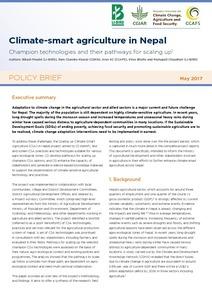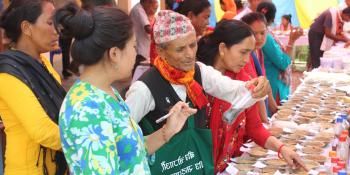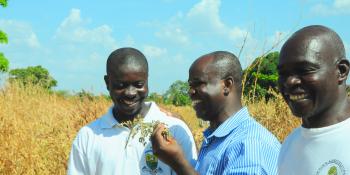Boosting efforts to help Nepal’s agricultural communities fight climate change

A project is being formulated to augment strategies to scale up climate-smart agriculture in Nepal.
Climate-smart agriculture in Nepal: Champion technologies and their pathways for scaling up
Nepal faces a disproportionate level of climate change impact and needs to be accorded climate justice, especially given its own minimal contribution to global emissions. Despite various interventions available to mitigate climate-induced challenges and achieve environmental, economic and social sustainability, Nepal is still reeling under the pressures created by the changing climate. In the crucial field of agriculture, addressing the continuing challenges of climatic variations such as long drought spells during monsoon season, increasing temperatures and unseasonal heavy rains during winters which causes serious distress to the agricultural communities, climate resilient practices need large scale adoption.
CCAFS South Asia and its local partner LI-BIRD have devised a project to scale up climate-smart agriculture (CSA) in Nepal in close collaboration with multiple stakeholders steered by a Project Advisory Committee comprising of representatives from Ministry of Agriculture and Development, Ministry of Population and Environment and other departments working in the agriculture and allied sectors.
What is included in the project plan?
- Identification of a pool of CSA technologies, practices and services relevant for the different agricultural production systems of Nepal,
- Prioritization of a set of CSA technologies in consultation with key stakeholders, and
- Assessment of pathways for scaling the portfolios of CSA interventions based on their nature, agro-ecological context and existing policy framework.
Although unique, the output generated by the project needs further verification, validation and refinements since climatic risks and socio-cultural context vary across locations. Three districts, Lamjung, Kaski, and Nawalparasi, were selected for testing and evaluation of CSA options covering varied agro-ecological regions. After consolidating data from the pilot sites and further verifying them for contextual and economic feasibility by the farmers, a list of 17 CSA options were created. Before identifying the pathways for scaling the CSA options, an understanding of the country’s diverse ecology, socio-cultural complexities, as well as climate sensitivities was quintessential. In addition to that, a review of existing policy frameworks had to be done to assess whether CSA has been integrated into the prevailing agriculture and climate change related policies, institutions and financial mechanisms.
It was found that although climate savvy adaptations under different policy spheres are present, a gap in terms of implementation exists which can mostly be attributed to a scarcity of evidence-based knowledge available on CSA options fitting with the Nepali farming system. Based on the need, context and policy framework, the project proposed 3 models to support the pathways for scaling up of CSA options in Nepal:
- Knowledge Transfer model: by affecting farmers’ adoption process through training, demonstration, exposure visits and similar modes of knowledge sharing.
- Commercial business model: involving private businesses which could help scaling through selling inputs required for the same.
- Policy incidence model: focussing on removing policy bottlenecks and acquiring increased government support.
For details on the project and its recommendations, please download:
Paudel B, Khanal RC, Khatri-Chhetri A, Bhatta K, Chaudhari P. 2017. Climate-Smart Agriculture in Nepal: Champion technologies and their pathways for scaling up. London, United Kingdom: Climate and Development Knowledge Network
Shehnab Sahin is the Communications Specialist for CCAFS South Asia.




